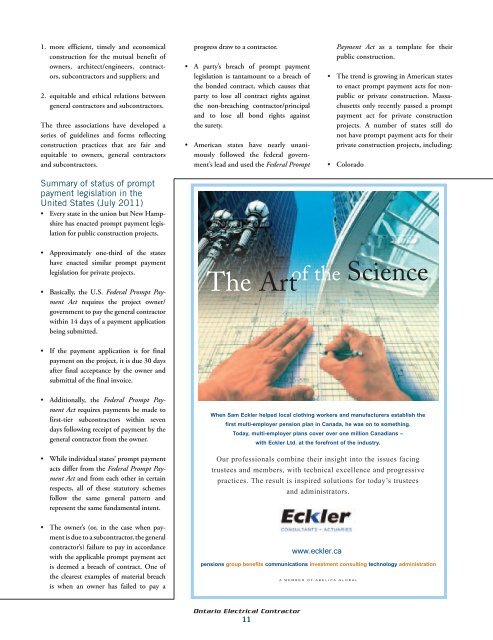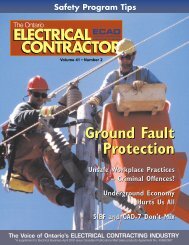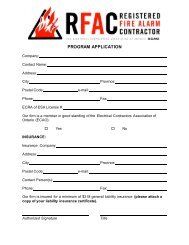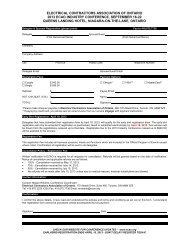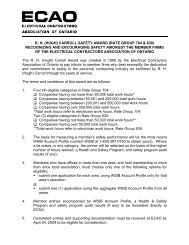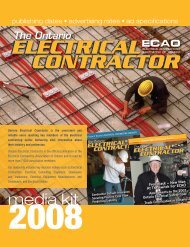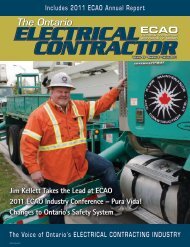Prompt Payment Legislation - Electrical Contractors Association of ...
Prompt Payment Legislation - Electrical Contractors Association of ...
Prompt Payment Legislation - Electrical Contractors Association of ...
- No tags were found...
Create successful ePaper yourself
Turn your PDF publications into a flip-book with our unique Google optimized e-Paper software.
1. more efficient, timely and economicalconstruction for the mutual benefit <strong>of</strong>owners, architect/engineers, contractors,subcontractors and suppliers; and2. equitable and ethical relations betweengeneral contractors and subcontractors.The three associations have developed aseries <strong>of</strong> guidelines and forms reflectingconstruction practices that are fair andequitable to owners, general contractorsand subcontractors.Summary <strong>of</strong> status <strong>of</strong> promptpayment legislation in theUnited States (July 2011)• Every state in the union but New Hampshirehas enacted prompt payment legislationfor public construction projects.progress draw to a contractor.• A party’s breach <strong>of</strong> prompt paymentlegislation is tantamount to a breach <strong>of</strong>the bonded contract, which causes thatparty to lose all contract rights againstthe non-breaching contractor/principaland to lose all bond rights againstthe surety.• American states have nearly unanimouslyfollowed the federal government’slead and used the Federal <strong>Prompt</strong><strong>Payment</strong> Act as a template for theirpublic construction.• The trend is growing in American statesto enact prompt payment acts for nonpublicor private construction. Massachusettsonly recently passed a promptpayment act for private constructionprojects. A number <strong>of</strong> states still donot have prompt payment acts for theirprivate construction projects, including:• Colorado• Approximately one-third <strong>of</strong> the stateshave enacted similar prompt paymentlegislation for private projects.• Basically, the U.S. Federal <strong>Prompt</strong> <strong>Payment</strong>Act requires the project owner/government to pay the general contractorwithin 14 days <strong>of</strong> a payment applicationbeing submitted.<strong>of</strong> the ScienceThe Art• If the payment application is for finalpayment on the project, it is due 30 daysafter final acceptance by the owner andsubmittal <strong>of</strong> the final invoice.• Additionally, the Federal <strong>Prompt</strong> <strong>Payment</strong>Act requires payments be made t<strong>of</strong>irst-tier subcontractors within sevendays following receipt <strong>of</strong> payment by thegeneral contractor from the owner.• While individual states’ prompt paymentacts differ from the Federal <strong>Prompt</strong> <strong>Payment</strong>Act and from each other in certainrespects, all <strong>of</strong> these statutory schemesfollow the same general pattern andrepresent the same fundamental intent.When Sam Eckler helped local clothing workers and manufacturers establish thefirst multi-employer pension plan in Canada, he was on to something.Today, multi-employer plans cover over one million Canadians –with Eckler Ltd. at the forefront <strong>of</strong> the industry.Our pr<strong>of</strong>essionals combine their insight into the issues facingtrustees and members, with technical excellence and progressivepractices. The result is inspired solutions for today’s trusteesand administrators.• The owner’s (or, in the case when paymentis due to a subcontractor, the generalcontractor’s) failure to pay in accordancewith the applicable prompt payment actis deemed a breach <strong>of</strong> contract. One <strong>of</strong>the clearest examples <strong>of</strong> material breachis when an owner has failed to pay awww.eckler.capensions group benefits communications investment consulting technology administrationA M E M B E R O F A B E L I C A G L O B A LOntario <strong>Electrical</strong> Contractor11


